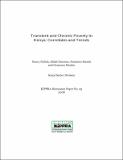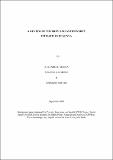Discussion Paper No. 49 of 2005 on Review of Policy Options for Poverty Reduction in Kenya
View/
Publication Date
2005Author
Type
KIPPRA Publicationsviews
downloads
Metadata
Show full item recordBy
Nafula, Nancy; Onsomu, Eldah N.; Mwabu, Germano & Muiruri, Stephen
Abstract/
Poverty in Kenya is caused by a number of factors, which include low agricultural productivity and poor marketing of industrial and agricultural products, insecurity, unemployment and low wages, poor governance, misallocation of land, inequality of income and assets, inequality in access to economic opportunities, lack of education, unfavourable climatic conditions, HIV/AIDs, gender insensitive properh; rights regimes, and weak democratic institutions. Efforts to combat poverty are thwarted by limited political commitment by government, donor-driven policies that lack local ownership, weak resource base for policy implementing agencies, exclusion of local organizations from policy implementation programmes, limited policy direction and lack of transparency and accountability in some sections of government. This study is a review of past studies on poverty. The study utilized secondary data from the Kenya Institute for Public Policy Research and Analysis and from national and international publications. One of the findings of this paper is that several studies on poverty have been conducted but little progress has been achieved in poverty reduction. The study shows that agriculture, health and education are the sectors that need to be reformed in order to make substantial progress in poverty reduction. A short term strategy should aim at raising productivity in agriculture, at promoting human rights and empowering people, and should target geographical areas prone to child labour and strengthen institutional capacities. The study recommends investment in human capital formation at all school levels and promotion of vigorous economic growth in the long run. There is also need to design monitoring and evaluation systems to assess effectiveness of poverty reduction programmes.
Subject/
Economic performance; Poverty alleviation; Employment creation; Poverty situation; Inequality
Publisher
The Kenya Institute for Public Policy Research and AnalysisSeries
DP/49/2005;Collections
- Discussion Papers [328]
Related items
Showing items related by title, author, creator and subject.
-
Discussion Paper No. 95 of 2008 on Transient and Chronic Poverty in Kenya: Correlates and Trends
Onsomu Eldah; Manda Damiano; Mwabu Germano & Nafula, Nancy (The Kenya Institute for Public Policy Research and Analysis (KIPPRA), 2008)The pattern of poverty incidence in Kenya has changed over time, with some households moving in and out of poverty while others or their descendants have remained in poverty for decades. Rural poverty, for instance, increased ... -
Discussion Paper No. 33 of 2004 on Poverty and Employment in Kenya
Oiro, Miriam W.; Mwabu, Germano & Manda, Damiano K. (The Kenya Institute for Public Policy Research and Analysis, 2004)At the time of independence in 1963, the Government of Kenya identified illiteracy, disease, ignorance and poverty as the main problems to be addressed in the post-independence era. In spite of the antipoverty measures ... -
Working Paper No. 03 of 2000 on a Review of Poverty and Anti-poverty Initiatives in Kenya
Manda, Kulundu D. ; Kimenyi, Mwangi S. Mwabu, Germano (The Kenya Institute for Public Policy Research and Analysis (KIPPRA), 2000)Poverty in Kenya is caused by a number of factors, which include a high degree of inequality of income and production resources, inequality in the access to economic and social goods and services and in the participation ...




